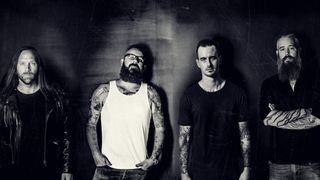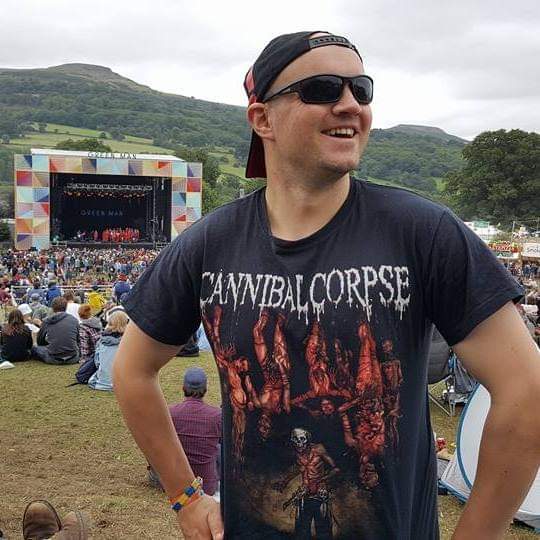In Flames are legends. Plain and simple. For almost 30 years, the melodeath pioneers broke ground with the ‘Gothenburg sound’ and have unleashed a dozen albums on to the world, carving out their own path through heavy music. Found on main stages and in arenas across the world, the Swedish powerhouse are showing no signs of stopping, which is testament to their talent and determination for creating music with genuine longevity.
But how do they see metal in the modern day?
We caught up with In Flames’ vocalist Anders Fridén to talk about the next headliners, the new scenes and whether or not we need the mainstream.
Will we ever see metal bands get big enough to headline the world’s largest festivals?
“I guess eventually the old headliners will retire and the rest of us will have to step up. Those big bands who we grew up with, Maiden and Priest, they’re stalwarts of metal and seem hard to replace but it’ll come naturally. These bands have such an extensive catalogue as well. You can have a band that blows up after an album or two and they become really big and sell lots of records that year, but it’s not the same as headlining a festival and keeping a show going for one and a half hours. It really takes time to become that band that has longevity, but I think there are a few out there.
“Magazines like you guys find bands and help them, but it’s in the hands of the bands to carry that torch. Bands can have all the support but they still have to deliver and work, work, work. Bands like us have never been the biggest thing and never will be the biggest thing, but we’ve been working hard for a long time and we do headline metal festivals in mainland Europe and Scandinavia. We can carry a show like that and put a lot of effort into the show with the lights and pyro.”
Is it important to keep showmanship alive, or does metal not need to worry about it? Do we need to support the bands who ramp up the theatricality element or big stage productions?
“I think it’s very important – fans pay money to come to the show. You can’t just play a show and walk away to the next, it’s not fair on anyone. If you give everything you have then hopefully the fans will come back and believe in you enough bring their friend next time. People don’t have enough money to go to every show that comes through town, and as bands aren’t selling as many albums, everyone is out there competing. You’ve got to treat your fans with respect and give them the best show that you can with the money.”
Does metal need the mainstream? Can we benefit from mainstream exposure and acceptance or does it compromise what we stand for?
“Metal is a music that’s carried by the fans. Back when I started tape trading, you heard from someone that there was a demo flying around and listened to really bad versions of Metal Up Your Ass for example. I mean it’s great when the mainstream machine kicks in and you get a lot of exposure, but as I said, the mainstream support won’t stay there forever, so it’s up to you to prove yourself. I certainly think metal deserves to be recognised but it doesn’t matter because this music and genre will last forever. Every ten years a new style comes in but these older bands are still bringing in a younger audience.”
Do we need to dump the stereotype of what rock and metal fans should look like? Does metal have a problem with living in the past when it comes to the whole ‘you must wear denim and leather’ and does that put people off?
“I think it’s really cool when you see young bands and fans come along with that look. They are super proud of the heritage and saying ‘Fuck everyone else, this is who I want to be’. I mean whatever is not the norm in society, whether it’s metal or not, is looked at by the mainstream as weird or scary. But you can have loads of different types of people who are into metal, especially with how many genres there are. You see all different kinds of people at our shows and that’s great, everyone is welcome.”
Where are all the scenes? Apart from a few niche pockets, there are no big scenes popping up. Why is that?
“I don’t care really, for me it’s just music. You have lots of these talent shows on TV where people want to get famous straight away, and have bands that want to record a demo and get it on the internet to get a little hype, but that all needs to start from the ground up. Before the Gothenburg bands got approached by labels and magazines we just played shows and practiced and practiced and practiced. Today we’re living in a fast food world where people consume things and spit it out. I’m not saying it’s better or worse, it’s just different. You can’t convince people to like you by just screaming as loud as you can, it takes hard work and a little bit of luck.”
In Metal Hammer 300, we gathered the biggest and best names in metal to debate the genre we love. Is metal in danger of stagnating? Do we take ourselves too seriously? What is metal anyway? Find out in Metal Hammer issue 300 – in stores and available to buy online now.
You can also read all of the issue 300 on TeamRock+ right this second.
Stone Sour, Korn, Ghost, Lamb Of God, Megadeth and more star in Metal Hammer 300


